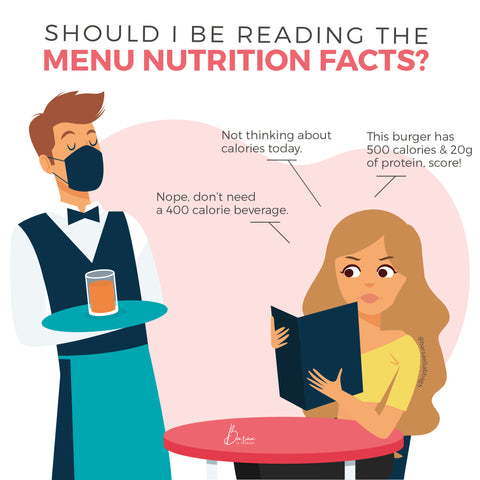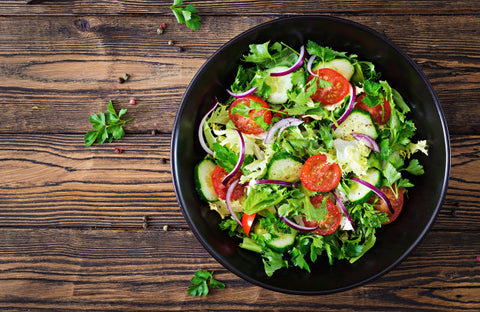
Should I Look Up Calories?
When you go out to eat or decide to order in, do you look up the calories of what you’re about to eat? If you do, then you’re probably a big fan of nutritional facts on the menu. Today, we’re going to talk about the pros and cons of having those facts readily available to us on menus and hopefully by the end of this post, you’ll know why it’s important to look for those facts and what to do with them when you find them.
Listen To Pros & Cons Of Menu Nutrition Facts

Like always, if this is a topic you’d love to learn about while doing other things that require focus, find the podcast episode here. Sometimes it’s just me talking to you guys about losing belly fat or the trick to bringing your motivation back, and other times I’m chatting with experts and guests to get YOU the best information out there. Plus, there’s always surprise at the end of each episode where I debunk myths about health you might have heard.
Advantage #1 Menus Help Us Gain Understanding
Team, the main and most important benefit to nutritional facts on a menu is gaining understanding and perspective. Take a second and imagine you’re about to order a chicken salad for lunch; you assume it’s about 500 calories, which factors into your day perfectly.
Sure, that sounds healthy and all but THEN you read the nutritional facts and you find that this salad is actually 800 calories. Because what you didn’t realize was the dressing was pretty heavy, the salad included croutons, there’s a coleslaw mix, maybe some sugared cranberries and candied pecans, and a lot of feta cheese.
So having the facts can give you answers! Especially, if you’ve been feeling like you’re doing everything in your power to get healthy, but the results just aren't showing up. In this case, it would be the extra 300 calories at lunch that you previously weren’t taking into consideration! See? That’s some helpful perspective!
Advantage #1 Maybe You’re Not On An Actual Calorie Deficit or Surplus
If you were on a calorie deficit because you have a weight loss goal, and it’s been a couple of months, and you still haven’t seen much of a difference, the hidden calories in dishes you were ordering would be the ones to blame.
With the help of menu facts, you can pinpoint exactly how many calories you’re eating. Same goes if you have a muscle gaining goal and you’re on a calorie surplus. When you don’t eat enough to balance your higher intensity workouts at the gym, you could find yourself losing muscle or halting your progress.
Advantage #2 Menu Facts Help You Find Balance
Second and important advantage to these nutritional labels: Knowing exactly how much you’re eating can help you find balance. Finding balance means accepting that I will occasionally have calorie-dense meals and being totally okay with that! It means I’m willing to eat a little less on other days or during other meals so I can enjoy every type of food in a balanced way.
It makes life a whole lot easier when I know that the iced caramel latte I’m about to have is 500 calories, and I don’t really need to go for other snacks on that day if I want to stay within my calorie requirements.
Advantage #3 Maintain Your Health With Nutrition Facts
Third advantage to having access to calories and facts on menus is it helps us maintain our health. Health is more than the size of your body, it’s waking up in the morning refreshed and feeling great. It’s having healthy bowel movements (sorry, but it’s true!), it's having the motivation to focus on your work, it’s having energy to play with the kids or completing 3 to 4 workouts a week.
Eating fried and unhealthy food on a regular basis will work against you, especially if you have a medical condition that needs special and constant nourishment. If you’re overweight and suffering from high cholesterol, blood pressure or high blood lipids and your best treatment is fat loss, then this is when it’s important to really make sure your health is taken care of by choosing the right foods to live a long and healthy life!
If you’re meant to be eating a certain amount of sugar per meal because you have insulin resistance due to PCOS or simply because your diabetic, nutritional facts on a menu can save you so much time and energy. Instead of having to google each separate dish and calculate the total number of calories and grams of sugar, all the info you need is literally right there.
Are You Miscounting Calories?
When you do your own calorie calculations, most of the time it’s an estimation that might not be representative of how the restaurant makes that meal and you wind up eating something you shouldn’t be having, which could result in digestive problems or blood sugar spikes.
Con #1 Of Menu Nutrition Facts
The first drawback is possibly developing the habit of reading the number of calories and nothing else. When you start tracking what you’re eating, you might find that some healthy dishes have the same number of calories as not so healthy dishes. So why order a 600 calorie salad when you can have the 600 calorie burger and fries?

When you think “Okay great, I’ll skip all my meals all day to have one big meal a day. I’ll be in a calorie deficit and I get to eat a burger!” you’re missing out on a whole day of nutrients and vitamins and energy refuel from a variety of meals that will give you your needed energy to function at your absolute best all day.
Sure, you can have that burger every once in a while, but I still want you to get the benefits from other food like eggs at breakfast or avocado and tuna at lunch. A calorie is not equal to another calorie when we’re talking about the quality. So, as long as you’re truly choosing what’s good for your body in terms of nourishing food and calories, you’re good to go!
Con Number #2 Developing Eating Disorders & Habits
Another disadvantage to getting hooked on calories on menus is the risk of developing disordered eating habits or eating disorders. Eating disorders have to be taken seriously, and I would hate to think you’re pouring over the menu facts or Googling the number of calories at every single meal or skipping meals altogether if a restaurant doesn’t have something that’s “healthy”. Not only does that take away from the enjoyment of eating, it’s not healthy for your mental or physical states.
Meal time also means enjoying the experience, a night out to socialize and eat a good bite, bonding with friends, catching up with family, enjoying a really well cooked meal with top-notch ingredients, some great extra virgin olive oil on a zesty salad and a ripe Californian avocado with a tuna taco on the side. Who’s counting calories today?
Most days, you might find yourself tracking healthily, but sometimes, you put that on the backburner to enjoy a simple good meal with great company, or even alone. If you find yourself panicking that the menu doesn’t have nutrition facts, it could be a good time to take a break from this whole routine, reassess your goals and give yourself a reboot.
Con #3 Vague Nutrition Facts Aren’t Helpful
Do you always get the answer you’re looking for on the menu? Sometimes they can be a little vague or unclear. Let’s take a grain salad for example, you might come across a Mediteranean salad filled with chickpeas, quinoa, nuts, seeds, and all sorts of vegetables. It lists that this salad has 800 calories, more than the philly cheesesteak sandwich also on the menu, which you heard was amazing.
But what the menu doesn’t tell you is how healthy and nutritious the salad is. In addition to packing a great amount of protein in the chickpeas and quinoa, it has fiber from the vegetables that work on keeping your gut healthy and your stomach full and your blood clean of cholesterol.
Yep, it’s high in calories, but ALSO it’s loaded with benefits that might keep you full and away from sugary snacks until your next meal a few hours later. See where I’m going with this? It’s not enough just to have the number of calories, you want to look into what the dish is made up of, how the nutrients can serve your body, and what the rest of your day looks like to make a well-rounded decision.
MYTH DEBUNKED: Homemade healthy food is the same as restaurant healthy food.
People always assume that healthy food from restaurants is just as nutritious as homemade meals. Now, that may be true for SOME places, with others, it really isn’t. Not to generalize, but often restaurants have their eye set on lowering their costs to profit more. Fair, right? But that also means, using vegetable oil like corn oil in your raw hummus instead of using olive oil. Their method of cooking and the ingredients used, are not always the best for your body.
But I will make the case for the transparent restaurants, those are the ones that are always honest with their methods of cooking and ensuring quality ingredients in every one of their dishes. We have a lot more of these restaurants popping up nowadays!
So as long as you’re taking the time to research the restaurant’s background and overall vibe, you can order from them knowing it’s as healthy as what you’re preparing at home. Also, whenever I ask the waiter about the ingredients, they do transparently share it.
P.S. I always eat the hummus even when it does have the oil, but I only find it fair when you also know how things are done.
Are You For or Against Menu Facts?
Personally, I LOVE finding the nutritional facts on a menu. I think it’s so much fun knowing how many calories are in a meal, snack, or coffee. I love making the best choice for me and my body without having to think about it on my own.
My decision to read nutritional facts was reconfirmed for me when I was in the US and heading to Panera Bread for a cup of coffee. You might have read this on my Instagram post, which is where I share most of my daily discoveries.
Now as I said earlier, you may see the number of calories on a menu and still go for it. That’s awesome! The point is to gain perspective from the facts on a menu to make better choices for YOU and stay within your recommended daily calories to gain, maintain or lose weight.
Subscribe to one of the top 5 UAE podcasts.
Stay connected with news and updates!
Join our mailing list to receive the latest news and updates from our team.
Don't worry, your information will not be shared.
We hate SPAM. Great content only!

